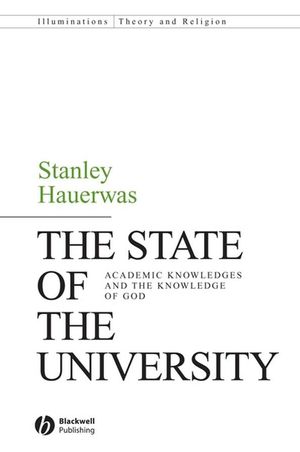The State of the University: Academic Knowledges and the Knowledge of GodISBN: 978-1-4051-6247-0
Hardcover
232 pages
June 2007, Wiley-Blackwell
 This is a Print-on-Demand title. It will be printed specifically to fill your order. Please allow an additional 10-15 days delivery time. The book is not returnable.
Other Available Formats: Paperback
|
||||||
“This collection of essays represents a significant challenge for all Christians involved in higher education, from presidents and professors to students and constituents. Hauer was passionately demonstrates the need for the Christian community to reclaim the university, not just for job training but as a place to develop a different way of speaking and living in the world.” (Pro Rege, March 2009)
“A first-order theologian turns his sights on one of the most influential institutions in the modern society: the university … Lively reading.” (Books & Culture)
“This collection is sometimes frustrating … and it raises more questions than it answers. Yet it ought to be read widely, and received as a gift to both the Church and the university. For anyone involved in the work of teaching, this book is a perfect invitation to think through questions of what we are doing and why.” (Church Times)
“One feels … invited to ruminate alongside the author ... Truly, food for thought.” (Cresset)
"With characteristic conversational energy, Hauerwas asks his readers to take seriously the difference which those who confess the God of the gospel can bring to institutions of learning. The book grows out of the free, generous and lively wisdom of faith, and deserves to be widely debated."–John Webster, King's College, Aberdeen
"Positioning himself against Yale University President Richard
Levin's defense of Liberal Education as a crucial source for "the
preservation of individual freedom", Stanley Hauerwas asks the
obvious but uncomfortable question, freedom for what? If students
pass through the courses in the curriculum as consumers and
sightseeers, they will replicate and extend the modern malaise of a
life lived without reference to anything that makes its moments
intelligible. If the university is to be more than a reflection of
an atomized society, those who live in it, says Hauerwas, must ask
two questions academics either avoid (here I am one of his
examples) or answer with empty pieties: what is a university for
and whom does it serve? It is the great merit of Hauerwas's book
that it refuses to back away from these questions, even as it
acknowledges the difficulty of giving a full and satisfying answer
to them. A witty, learned , and very human meditation on the
relationship between the factories of knowledge and the knowledge
of God."
–Stanley Fish, Florida International University
“This book by an eminent Christian theologian is
provocative for thinking fruitfully about our troubled times.
Hauerwas has a subtle, learned and compassionate mind, which he
brings to bear on the secular state in which we live and on the
secular knowledge produced in our universities to serve it.
Non-Christians like myself will find reading this book a
mind-widening experience.”
–Talal Asad, CUNY
"Whether one agrees or disagrees with some of the positions
Hauerwas stakes out, reading his work is always a bracing
intellectual experience - and a deeply Christian one. The State
of the University proves no exception. With characteristic
theological craftsmanship, humor, and passion, Hauerwas turns his
sights on the contemporary university, in all its dignity,
wrongheadedness, goodness, and confusion. Anyone interested in the
fate of theological knowledge in contemporary society, anyone
interested in serious education (or lack thereof) in liberal
democracies, anyone who cares for the mission of the church in the
twenty-first century will profit considerably from reading and
rereading this book."
–Thomas Albert Howard, Gordon College, Oxford



